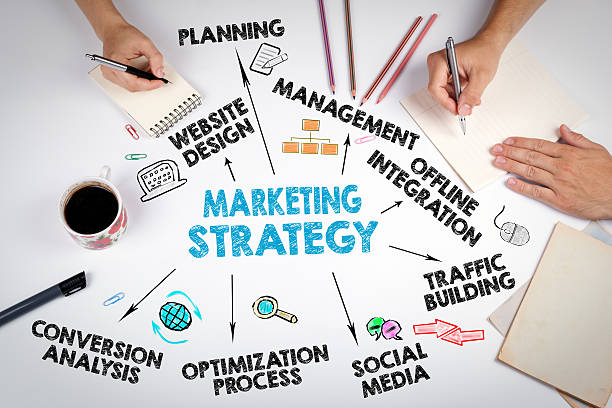
In today’s hyper-competitive digital landscape, a robust marketing strategy is the cornerstone of success for any business. Whether you’re a startup or an established brand, crafting a strategy that resonates with your target audience while achieving your business goals is critical. This comprehensive guide will walk you through the essential steps to build a marketing strategy that not only drives traffic but also fosters long-term growth and customer engagement.
Define Your Goals and Objectives
The foundation of any successful marketing strategy is a clear understanding of your goals. Are you aiming to boost brand awareness, drive website traffic, generate leads, or increase sales? Your objectives should be specific, measurable, attainable, relevant, and time-bound (SMART). Setting well-defined goals helps you align your marketing efforts with broader business aspirations. For instance, if your primary objective is lead generation, focus on SEO strategies, paid advertising campaigns, and content marketing tailored to capture high-quality leads.
Understand Your Target Audience
Effective marketing hinges on knowing your audience inside out. Conduct thorough market research to identify your ideal customers, their preferences, behaviors, and pain points. Utilize tools like Google Analytics, social media insights, and customer surveys to gather valuable data. Creating detailed buyer personas allows you to personalize your campaigns and craft messages that resonate deeply with your audience. Remember, the more you understand your customers, the better you can tailor your marketing efforts to meet their needs.
Conduct a Competitive Analysis
In the crowded digital space, it’s vital to know who you’re up against. Analyze your competitors to uncover their strengths, weaknesses, opportunities, and threats (SWOT analysis). Study their SEO strategies, content marketing approaches, social media presence, and paid advertising tactics. Tools like SEMrush and Ahrefs can provide insights into their keyword rankings and backlink profiles. Use this data to identify gaps in the market that your business can exploit, positioning your brand as a unique solution to customer problems.
Choose the Right Marketing Channels
Not all marketing channels are created equal, and understanding which platforms align with your goals is essential. For instance, if your audience is highly active on social media, platforms like Instagram, Facebook, and LinkedIn may yield significant results. Alternatively, if you’re targeting professionals, email marketing campaigns and LinkedIn Ads might be more effective. Diversify your approach by combining organic efforts like content marketing and SEO with paid strategies such as Google Ads and social media advertising to maximize reach and ROI.
Develop a Content Marketing Strategy
Content is king in the digital marketing realm, and creating valuable, relevant, and engaging content is non-negotiable. Develop a content strategy that includes blog posts, videos, infographics, podcasts, and eBooks that address your audience’s needs and questions. Incorporate keywords naturally to boost your SEO rankings and ensure your content is optimized for both search engines and user experience. Additionally, maintain a consistent posting schedule and leverage content repurposing to maximize your efforts across multiple platforms.
Implement Search Engine Optimization (SEO)
SEO is a critical component of any digital marketing strategy. Optimize your website with relevant keywords, meta tags, and high-quality content to improve visibility on search engines. Focus on technical SEO elements such as site speed, mobile-friendliness, and secure HTTPS protocols. Building high-quality backlinks and utilizing local SEO techniques can also enhance your online presence. Remember, SEO is a long-term game, but the results can be transformational for your business.
Leverage Social Media Marketing
Social media is an indispensable tool for connecting with your audience, building brand loyalty, and driving traffic to your website. Create a robust social media strategy that includes both organic and paid efforts. Use analytics tools to monitor engagement rates, identify high-performing content, and refine your strategy over time. Experiment with different formats like live videos, reels, and carousel posts to keep your content fresh and engaging. Additionally, don’t overlook the power of social media advertising to reach new audiences and achieve your business goals.
Invest in Paid Advertising
While organic strategies are essential, paid advertising provides an immediate boost to your marketing efforts. Platforms like Google Ads, Facebook Ads, and Instagram Ads allow you to target specific demographics with precision. Develop ad campaigns with compelling visuals and persuasive copy to capture attention and drive conversions. Monitor your campaigns closely, using A/B testing to determine what resonates most with your audience. Paid ads are particularly effective for promoting limited-time offers, new product launches, or events.
Track and Analyze Performance Metrics
A successful marketing strategy requires constant evaluation and adjustment. Use analytics tools to track key performance indicators (KPIs) such as website traffic, conversion rates, social media engagement, and ROI. Platforms like Google Analytics, HubSpot, and Hootsuite offer detailed insights into your campaign performance. Regularly review these metrics to identify what’s working and where improvements are needed. This data-driven approach ensures your strategy remains dynamic and responsive to changing market trends
Stay Agile and Adaptable
The digital marketing landscape evolves rapidly, and staying ahead requires agility. Keep an eye on emerging trends such as voice search, artificial intelligence, and interactive content. Experiment with new technologies and platforms to maintain a competitive edge. Continuously educate yourself and your team through webinars, industry conferences, and online courses. By embracing change and staying adaptable, you can ensure your marketing strategy remains effective in an ever-changing environment.
Final Notes
Creating a successful marketing strategy is an ongoing process that requires careful planning, execution, and refinement. By defining clear goals, understanding your audience, leveraging the right channels, and staying data-driven, you can build a strategy that delivers measurable results. In the fast-paced world of digital marketing, consistency and adaptability are your greatest allies. Start building your strategy today and position your brand for long-term success.